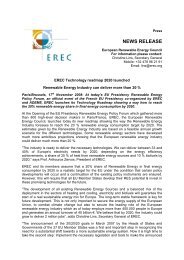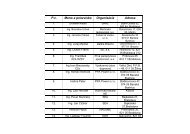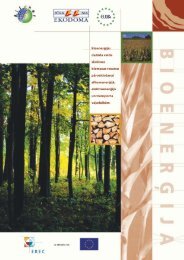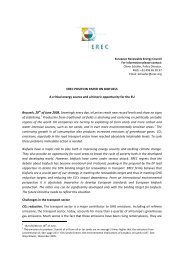CTO Assessment - European Commission
CTO Assessment - European Commission
CTO Assessment - European Commission
You also want an ePaper? Increase the reach of your titles
YUMPU automatically turns print PDFs into web optimized ePapers that Google loves.
SLOVENIA<br />
Removing barriers to the<br />
increased use of biomass<br />
Contact: Jani Turk Msc • National Director of the GEF Project<br />
Dimièeva 12 • 1000 Ljubljana • Slovenia • Tel/Fax: +386 1300 6995/91<br />
E-mail: jani.turk@gov.si • Website: www.gov.si/aure<br />
The focus of the project, sponsored by<br />
UNDP and GEF, is on wood biomass based<br />
district heating (BDH). The projects to be<br />
supported will be selected through a «public<br />
call for tenders». The objective of this<br />
project is to facilitate the financing for at<br />
least 3 BDH projects over its 3-year duration.<br />
Based on the results of these projects<br />
to promote further initiatives in other communities.<br />
Main aims and motivations<br />
The project aims to reduce and remove<br />
barriers to the increased use of biomass.<br />
It also supports the sustainable development<br />
of the local economies by creating<br />
new income and jobs.<br />
There is also concern to reduce energy dependence<br />
and to push for the prioritization<br />
of RES issues in Slovenia.<br />
Project details<br />
To achieve the goal of exploiting the biomass<br />
potential of Slovenia the GEF project<br />
created many initiatives. Activities include<br />
feasibility studies and business and finance<br />
plans for at least 20 projects.<br />
The Biomass Energy Fund was established<br />
in 2002 to finance biomass projects. Training<br />
seminars, workshops, public calls for<br />
preparation, dissemination of information,<br />
airtime 3-5 times per year on both television<br />
and radio networks are amongst the<br />
areas the project covers.<br />
Overall evaluation<br />
In bigger municipalities and ones with coherent<br />
political interests the reaction was<br />
positive. There are some problems, however,<br />
in municipalities with political tensions.<br />
The perception of biomass energy<br />
use at a national level has also had some<br />
negative review due to unsuccessful biomass<br />
district heating projects in the past.<br />
Main innovative feature<br />
The project made use of private-public<br />
pooling and involved the local community<br />
through allowing them to invest in their<br />
own heating substations. The Biomass<br />
Energy Fund was also set up to distribute<br />
project funds to those applying through<br />
calls for tender.<br />
Enabling factors<br />
The Ministry of Environment, Spatial<br />
Planning and Energy gave the project<br />
grants and also helped in public awareness<br />
campaigns along with the Agency for the<br />
Efficient Use of Energy and the<br />
INTERREG IIIB Project Alpenwood. The<br />
Ministry of Finance provided both legal<br />
and administrative support.<br />
Challenges<br />
There is a lack of a competent consulting<br />
market to provide feasibility studies and<br />
appropriate design systems. This was overcome<br />
by training consultants and the GEF<br />
project team demonstrating examples to<br />
the local experts.<br />
It is necessary to find sources of initial<br />
investment and partners due to the poor<br />
investment capacity of small municipalities.<br />
Maintaining close contact with and<br />
close involvement of four strategic partners<br />
tackled this problem. One private<br />
investor is already participating in the<br />
financing of one of the projects proposed<br />
for financial support within the GEF<br />
project framework.<br />
The EU Accession process has influenced<br />
the legislative framework in that<br />
administrative conditions for creation of<br />
equity funds and financing of some small<br />
activities are less favourable due to strict<br />
EU environmental state aid support<br />
regulations. This was overcome by liaising<br />
closely with all the relevant ministries<br />
throughout the designing process.<br />
As a result, the project implementation<br />
and financing models were approved as<br />
they conformed to the standards required.<br />
Replication Potential<br />
The project in Slovenia is not a replication<br />
in itself and has not yet been replicated.<br />
The main activities are applicable for a<br />
variety of projects due to their comprehensiveness<br />
and horizontal structure. The successful<br />
execution of the project in Slovenia<br />
could stimulate replications in other Accession<br />
countries.<br />
Change in perception of implementing<br />
RES projects (1999 – 2003)<br />
The issues of sustainable energy are of a<br />
greater concern today than in 1999 and<br />
the obstacles to implementing RES<br />
projects are decreasing. The population in<br />
general is more willing to support such<br />
projects and it is also getting easier to finance<br />
them.<br />
Key facts of the pr<br />
3-5 Wood biomass district heating installations were planned and so far 1 has<br />
been approved for financing in three months time<br />
23 feasibility studies are currently in preparation<br />
30 municipalities had signed the Letter of Interest in the project by the end of 2002.<br />
The Biomass Energy Fund was established in 2002 to finance biomass projects.<br />
RES Increase<br />
This is not yet known. The estimated CO 2<br />
emissions avoided as a result of the first<br />
two large scale projects applying for the<br />
GEF equity investment and Government<br />
grant is 3,600/CO 2<br />
/yr.<br />
<strong>CTO</strong> - Showcase<br />
85




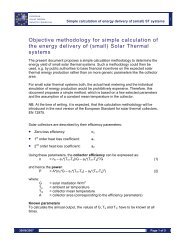
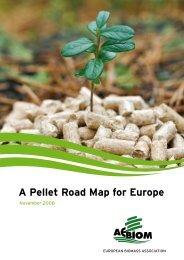
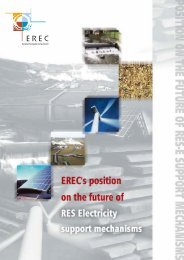
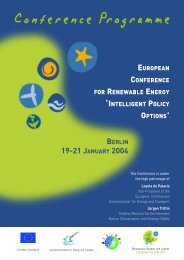
![Energy [R]evolution - Greenpeace](https://img.yumpu.com/47174859/1/184x260/energy-revolution-greenpeace.jpg?quality=85)
